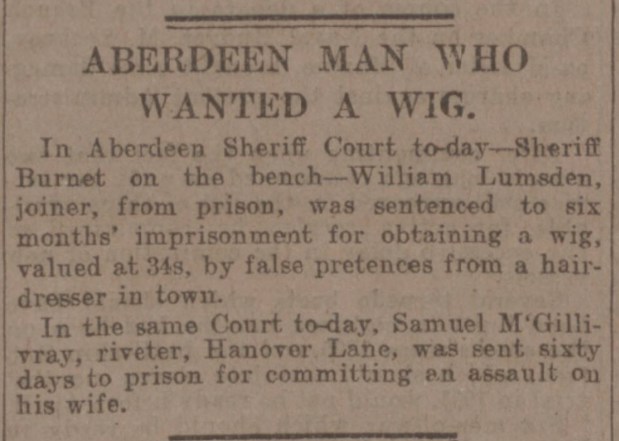22nd December 1900. Aberdeen Sheriff Court has its priorities in order…

Source: Dundee Evening Post. 22nd December 1900. pg. 3
22nd December 1900. Aberdeen Sheriff Court has its priorities in order…

Source: Dundee Evening Post. 22nd December 1900. pg. 3
In 1640, so many Aberdonians brought their dogs to church, the burgh council had to ban them from sermons. “The barking and peturbation of these dogges, aftin withdraw people from hearing of God’s word!”

UPDATE: It seems that it was fairly common for shepherds and other folk to bring their dogs to church with them, which for some parishes, was considered “sabbath-breaking”. In Inverurie there were stiff fines for bringing your dog to the kirk as outlines in this extract from the Kirk Session minutes:
Every an that brings doggs to the kirk with them to pay 40 shillings for the first time; hav a merk for the second tym, whilk is still to be doublit, so long as they continue so doing.
Inverurie Kirk Session Minutes, 17th February 1650.
In March 1673, Oyne parish kirk in The Garioch, Aberdeenshire, paid for a “dog-clip” to be made– a long handled pair of forceps that the official dogwhipper would use to grab dogs from the church and take them outside.
The role of “dogwhipper” can be seen the bottom right of David Allan’s 1807 etching “Presbyterian Penance (The Black Stool).

Mackinlay, J. (1897). Dogs in Church. Proceedings of the Society of Antiquaries of Scotland, 31, 98-103.
Turreff, G. (1871) Antiquarian Gleanings from Aberdeenshire Records. James Murray, Aberdeen. pg. 174
Davidson, J. (1878) Inverurie and the Earldom of the Garioch. David Douglas, Edinburgh. pg. 316.
On the 28th April 1647, Isobel Kemp was banished from the town of Aberdeen for “hir bad and abbominable conversation”. She was banished on “payne of drouning” and anyone harbouring her would be fined or lose their pension.
Imagine if your patter was that bad…
Twitter user @Meldrum04 shared some additional info on Isobel from an Aberdeen history book. Turns out she was a tapster, someone who sells ale door to door. She was married but had been found cavorting with another man, which is probably what “conversation” means here.
Stuart, J. (ed.) (1872) Extracts from the Council register of the burgh of Aberdeen. Scottish Burgh Records Society, Edinburgh, pg.84.
In February 1597, Aberdeen women Johnnet Wischart and Issobell Cockie were accused of witchcraft and sentenced to death. Aberdeen invoiced them for their own burning. They were also billed for the burial of their “accomplice”, Issobell Mantheith.

From what I can tell from the burgh record extracts, Issobell, Johnnet, and Johnnet’s son Thomas Leyis were named “ringleaders” in group conviction of witches and the three of them were sent bills as they were able to pay. Others were already dead or unable to pay. Issobell Mantheith had hanged herself in prison before she could be executed.

It looks like the whole Leyis family were an unpopular one as they (7 of them) plus 3 complices were executed or banished. The Survey of Scottish Witchcraft says doesn’t mention strangulation, just that they were burnt. (Women convicted of witchcraft were usually strangled before being cremated, but in 1597, they seem to have been burnt alive).
UPDATE: I’m sure a historian of witch trials in Scotland could say much more about how common it was to be invoiced for your own death, but I found some more examples of “receipts” in the Annals of Pittenweem for the 1640s.
3d Nov. 1643. — John Dawson has made payment of his grassmail, and of the soume of £40, expenses depursit upon executing his wyff, to the treasurer.
18th Dec. 1643 –Thomas Cook, son to Margaret Horsbrugh, is ordainit to pay three score of punds for expenses debursit on the executing of his said mother for witchcraft.
12th Jan 1644.– Archibald and Thomas Wanderson are decerned to pay the soumes of ane hundredth marks for defraying of the charges depursit upon their wives, execut for witchcraft.
Cook, D. (ed.) (1867) Annals of Pittenweem : being notes and extracts from the ancient records of that burgh, 1526-1793. pp.49-50
In October 1626, parties after baptisms had gotten so out of hand that Aberdeen made it illegal to “compell any nichtboures to drink any wyn, aill, or beir” that they didn’t want to. Anyone caught pressuring someone to drink was fined £40 (roughly the equivalent of £700 to £900, in 2019).


The 14th century chronicler Jean Froissart wrote in French. After travelling in Scotland, he invented French translations for Scottish places.
Edinburgh – HANDEBOURCH
Stirling – STRUVELIN
Roxburgh – ROSEBOURCH
Aberdeen – BREDANE
Fife – FII
Dalkeith – ALQUEST
Dundee – DONDIEU
Dumbarton – DOUBRETAGNE
Strathearn – ASTRADERN
Erskine – VERSI
Buchan – BOSQUEM
Sutherland – SURLANCKT
Moray – MORET
Jedburgh – GEDEOURS

James Melvin (1795-1853) rector of Aberdeen Grammar School banned students from using Doric Scots, except when translating Latin poetry, where “the pith and force of the Scots tongue” could be properly used. Here are some of his lines1 I have omitted his “apologetic apostrophes” but left his spellings mostly intact. from Ovid’s Metamorphoses.
There I saw Sisyphus, wi mickle wae,
J. Riddell (1868) Aberdeen and its Folk from the 20th to the 50th Year of the Present Century
Birsin a big stane up a heich brae,
Wi aa his micht oot ower the knowe,
Wi baith his hands an feet, but wow!
When it’s maist dune, wi awful dird,
Doun stots the stane, an thumps upo the yird.

from circa 1830.
“A peacock pykit a peck o paper oot o a paper poke. Pyke paper, peacock!”
“Ah snuff shop snuff. Dae ye snuff shop snuff?”
J. Riddell (1868) Aberdeen and Its Folk, from the 20th to 50th Year of the Present Century.